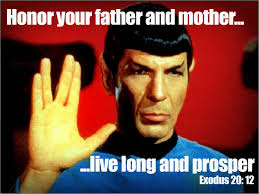This study touches on subjects that have been gone over in detail in previous studies. Before going over this study, please make sure you have a complete understanding of the the study on The Third Commandment – Bearing God’s Name.
The first four commandments were instructions showing us how to love YHVH. With the fifth commandment, we begin learning how to love our neighbors as ourselves. How brilliant of YHVH to begin with how we treat the very first and most important teachers in our lives – our parents!
“Honor your father and your mother, that your days may be long in the land that YHVH your God is giving you.“ Exodus 20:12
This commandment gives us a small piece of the specific plan YHVH has for the family structure and its purpose. While this piece of the puzzle is directed at anybody who has a parent, the application goes beyond the natural to the spiritual family of YHVH.
One of the main purposes of mankind is to be the very image of YHVH. The third commandment even says that we are not to take (bear or carry) YHVH’s name in vain.
“You shall not take the name of YHVH your God in vain, for YHVH will not hold him guiltless who takes his name in vain.” Exodus 20:7
Consider a family that is set up the way YHVH intends. In this family, the parents are servants of YHVH, and are the image of our heavenly Father. Through their example and their teachings, they are the very first understanding of who YHVH is to their children. As children grow learning to honor their parents, they are also learning to honor YHVH.
Hear, my son, your father’s instruction,
and forsake not your mother’s teaching,
for they are a graceful garland for your head
and pendants for your neck. Proverbs 1:8-9As a father shows compassion to his children,
so YHVH shows compassion to those who fear him. Psalms 103:13
While honoring your parents does include obeying them, it is really much more than that. The Hebrew word for honor is kabad and means to be heavy, ie to treasure. Consider how we treat things we treasure. Most do everything in their means to make sure that their treasure is safe and cared for. This is how we are to perceive our parents.
 As children, honoring or treasuring anything is something that is difficult to understand. Most children love their parents simply out of love, but a big part of their love comes from a dependency of their parents. As they grow into the teenage years, they begin thinking that they no longer need their parents – that they can do things on their own. Approaching adulthood, we begin to realize that everything our parents did was for our sake. We realize that they really did their best to make sure we become followers of YHVH and decent human beings. This is not the time to forget our parents. This is the time when we truly start to understand their value. This is the time to show them that they are a treasure to us.
As children, honoring or treasuring anything is something that is difficult to understand. Most children love their parents simply out of love, but a big part of their love comes from a dependency of their parents. As they grow into the teenage years, they begin thinking that they no longer need their parents – that they can do things on their own. Approaching adulthood, we begin to realize that everything our parents did was for our sake. We realize that they really did their best to make sure we become followers of YHVH and decent human beings. This is not the time to forget our parents. This is the time when we truly start to understand their value. This is the time to show them that they are a treasure to us.
(Suggested Reading: Genesis 42-47:12) In Genesis, we are given an excellent example of a son who honors his father. Many know the story of Joseph and the love his father had for him. His father’s love caused jealousy in the brothers of Joseph who sold him into slavery. As soon as he was sold, Joseph lost all contact with his family and had no knowledge of their condition. Several years in Egypt later, Joseph was able to see his brothers. At this point in the story, Joseph disguised himself so that his brothers did not know who he was, but he made it a point to find out how his father was – twice. He was also very sneaky in providing the needs of his father and the family he cared for – twice. Finally, upon revealing himself, Joseph sent for his father to come live in Egypt.
“You must tell my father of all my honor in Egypt, and of all that you have seen. Hurry and bring my father down here.” Genesis 45:13
Joseph treasured his father. He cared for him as soon as he was able, and when he brought him back to Egypt, he continually provided for him.
And Joseph provided his father, his brothers, and all his father’s household with food, according to the number of their dependents. Genesis 47:12
Today, there is a growing epidemic that has brought about a lack of honor to our parents, but this isn’t the first time this has happened. During his time in Earth, Jesus dealt with this same issue. During one of the many times he was confronted by the pharisees, they were upset that Jesus would not correct his disciples for refusing to follow one of their traditions. In his rebuttal, Jesus touched on many of their traditions that went against the commandments of YHVH, including one that went against the command to honor your parents.
And he said to them, “You have a fine way of rejecting the commandment of God in order to establish your tradition! For Moses said, ‘Honor your father and your mother’; and, ‘Whoever reviles father or mother must surely die.’But you say, ‘If a man tells his father or his mother, “Whatever you would have gained from me is Corban”’ (that is, given to God) — then you no longer permit him to do anything for his father or mother, thus making void the word of God by your tradition that you have handed down. And many such things you do.” Mark 7:9-13
This particular tradition that the pharisees enforced created a sense of irresponsibility in the people. The pharisees taught that the people were no longer responsible to provide for their parents if they gave a gift of money to the temple (Corban*). Instead, the temple would take care of their parents. In some cases, the pharisees wouldn’t even allow the people to help their parents at all once they had already given their gift. This went directly against the commandment to honor – treasure – your parents.
We have seen how scripture shows honoring your parents as obeying them and caring for them, but there is another important condition to honoring your parents. Each person bears the family name (their last name) that belongs to their father. Through this name, we represent our parents. Although I’m sure Joseph didn’t know how things would end up for him, his father, and his father’s family, I believe Joseph conducted himself in the way that his father taught him and in a way that represented Jacob. This is evident throughout the time Joseph spent in Egypt. He rose from being a slave to being an overseer in the house of the man (Potiphar, the captain of Pharaoh’s guard) who bought him.
So Joseph found favor in his (Potiphar’s) sight and attended him, and he made him overseer of his house and put him in charge of all that he had. From the time that he made him overseer in his house and over all that he had, YHVH blessed the Egyptian’s house for Joseph’s sake; the blessing of YHVH was on all that he had, in house and field. So he left all that he had in Joseph’s charge, and because of him he had no concern about anything but the food he ate. Genesis 39:4-6
Joseph managed Potiphar’s household in the same way his father taught him to care for his own family.
Later, although he was thrown in prison, he was put in charge over the prisoners by his keeper. Finally, when he was released, Joseph was then made overseer of all the land of Egypt by Pharaoh himself.
You shall be over my house, and all my people shall order themselves as you command. Only as regards the throne will I be greater than you.” Genesis 41:40
Scripture shows us that Jacob gave Joseph a robe of many colors. This robe symbolized the position of authority that was to be handed down to him. He was in training to be the head of Israel’s house.
Now Israel loved Joseph more than any other of his sons, because he was the son of his old age. And he made him a robe of many colors. Genesis 37:3
Jacob taught Joseph the characteristics and wisdom through which he conducted himself in Egypt which was a representation of his father in all that he did. This is ultimately what saved them all. Because Joseph conducted himself the way he did, Pharaoh offered land to his family (Jacob and and all of Joseph’s brothers), and Joseph’s father was considered a value to Egypt by the association of his son.
What a beautiful example of the fifth commandment that all of the children of Israel heard from the very mouth of YHVH! Just as we bear or carry the name of YHVH by being representatives of Him, we are to honor our parents by doing the same for them. The honor or value we give to our parents reflects the honor or value we put on our heavenly Father. Yes, we are to obey them, but when YHVH says to honor our parents, he is concerned with more than how we treat them. He is also concerned with how we value them. The value we place on our parents is then shown through our representation of them. This goes beyond an outside show; it comes from the heart. This is love.
